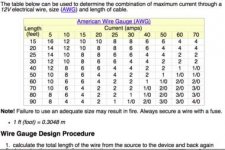The pump motor is obviously less than a 10 amp motor, because that is about all you are going to get in a 15 to 25 foot section of 10AWG wire. It is good for max 15 amps at 12v and you will lose .6 v in a 20 foot circuit. If you have a an alternator charging at 13.4 V the best you are going to get to your house batt is 12.8v and maybe 15 amps. More likely less than that.
For a 50% discharged house battery, it would take every bit of 10 hours to charge it to anything remotely resembling a full charge.
BTW, I did not say that it was a trickle charge or battery maintainer, I said it was designed to maintain a charge on a breakaway battery. And that is was never designed to charge house batteries.
Further, if you are towing with a dead house batt, while it is being charged by your 7 pin, you do not have a battery capable of activating your electric breaks in the event of a breakaway until it reaches the voltage and amp capacity to activate it and hold the brakes.
I don't know about your truck but my Ford is more than a trickle charger. When I picked up a SOB at the dealer after repair and he didn't disconnect the battery I found the battery was completely dead. I hooked up the 7 pin plug and used the truck battery to raise the landing gear so I could hook up. The wire to aux power in the 7 pin is 10ga. Tell you anything?

